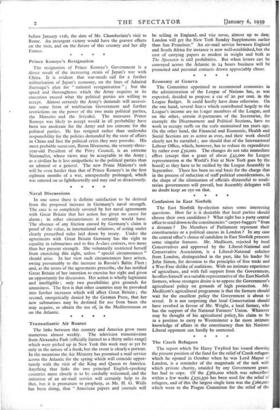The resignation of Prince Konoye's Government is a direct result
of the increasing ,strain of Japan's war with China. It is evident that war-needs call for a further militarisation of Japan's economy, on the lines of Admiral Suctsugu's plan for " national reorganisation " ; but the speed and thoroughness which the Army requires in its execution exceed what the political parties are willing to accept. Almost certainly the Army's demands will necessi- tate some form of totalitarian Government and further restrictions on the power of the two main political parties, the Minseito and the Seiyukei. The measures Prince Konoye was likely to accept would in all probability have been too moderate for the Army and too extreme for the political parties. He has resigned rather than undertake responsibility for the policies demanded by the state of affairs in China and face the political crisis they may provoke. His most probable successor, Baron Hiranuma, the seventy-three- year-old President of the Privy Council, is an extreme Nationalist, whose views may be acceptable to the Army ; as a civilian he is less antipathetic to the political parties than an admiral or a general. The new Prime Minister's task will be even harder than that of Prince Konoye's in the first eighteen months of a war, unexpectedly prolonged, which was entered on so lightheartedly and may end so disastrously.
* * * *










































 Previous page
Previous page